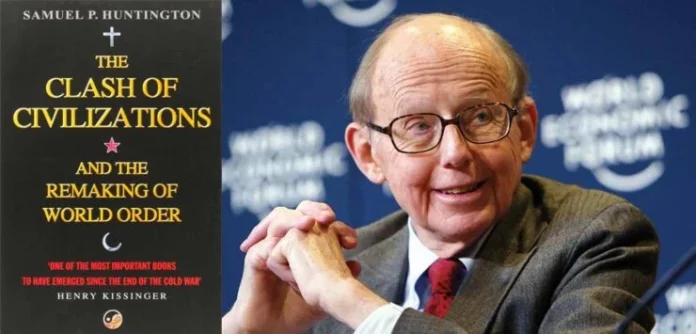Human life and institutions are considered to be constantly in a dialectical state. Institutions, empires and socio-political structures emerge, rise and finally wither away. More so in the case of political and cultural theory, however, there are times when a theory can be influential to the point of changing entire societies and the face of global politics. One such thesis has been the hugely influential yet extremely controversial thesis of ‘Clash of Civilisations’ by the late Harvard University academic Samuel P Huntington. The theory which was developed in the form of an article for the renowned American foreign policy magazine Foreign Affairs in 1993 was received well and this led to the development of the 1996 book of the same name with an extended title – Clash of Civilizations and The Remaking of World Order. The theory posits that the end of the cold war would see the end of the ideological makeup of the world order and that conflicts of the future would be on the basis of cultural factors with religion playing a definite role in these conflicts.
In the book, Huntington argued that Western arrogance, Islamic revivalism and Asian assertiveness would be responsible for hugely influencing not just how global politics of the future would be shaped but how societies, institutions and people in general in the various nation-states would engage in local and global fault line conflicts.
The theory was highly controversial, it received ubiquitous acceptance from the Western world and some parts of the Asian community particularly in China which Huntington posited would be the greatest force in world politics. However, the Islamic World was unanimous in its condemnation of the theory because it was opprobrious of the Islamic world for being the architect of global Islamist terrorism and the surrounding problems it wrought.
Thirty years have passed since the inception of the theory. World politics has experienced sea changes with the emergence of new players and new forces influencing the nature and institutions of world politics. The key question is this: Is world politics still influenced by cultural and religious frictions as the theory asserted?
The answer to this controversial yet important question is complicated, while the forces of globalisation have resulted in the globalisation of finance and trade resulting in the free flow of capital, goods and services, it hasn’t resulted in the free movement of people. This is where the theory becomes highly relevant. Even after thirty years, the world is still divided by the forces of culture and religion. The Middle East and South Asia are still a divided house, while ISIS has been largely wiped out as a force to reckon with, yet religious extremism and sectarian conflict remain at large. This is particularly evident from the situation in Iran, Syria, Lebanon, Egypt, Pakistan, Afghanistan etc.
Both religion and culture remain influential in articulating a fault line-like conflict between the swing states like India, Turkey etc, and the core states like the USA, UK, and Sweden etc. The situation in India is particularly significant with an internal clash of civilisation taking place
The recent diplomatic impasse between Sweden and Turkey has occurred as a result of the unwillingness of Swedish authorities to crack down on Kurdish and far-right anti-Islamic bodies and individuals in the country.
While Karl Marx dismissed the idea of religion as “opium of the masses”, he might not have imagined the power and influence religion wielded. However, the fact that religion which was surreptitiously sidelined by ideology during the cold war era would once again make a comeback and would do so violently was visioned before its time by Samuel P Huntington and even after thirty years of the publication of the article/book religion and culture continue to exercise disproportionately high influence – this is evident from the 26/11 attacks in India perpetrated by the Pakistan based terror group Lashkar-e-Taiba.
The weaponisation of religion and culture for the conscious process of distinguishing between us/them as Robert Sapolsky in his book Behave- The Biology of Humans at our Best and Worst has been the direct product of this theory.
Conclusion
Thirty years on, the theory continues to have its fair share of critics and proponents. What is however necessary is to acknowledge the depth and knowledge of this legendary academic. On the issue of the large picture, there is a need to embrace the good qualities of the theory while propagating the message of amity and Jawaharlal Nehru’s idea of “unity in diversity”. The world is facing existential threats of global warming, climate change and spectre of automation, therefore, humanity cannot waste its precious time and energy in religious and cultural squabbles.
–The writer is currently working as a Research Associate at Defence Research and Studies (dras.in) and is a columnist. The views expressed are personal and do not necessarily reflect the views of Raksha Anirveda
–The writer is currently working as a Research Associate at Defence Research and Studies (dras.in) and is a columnist. The views expressed are personal and do not necessarily reflect the views of Raksha Anirveda






